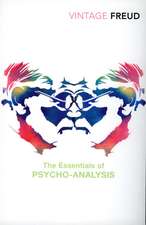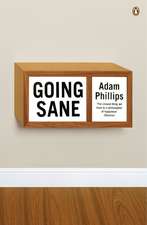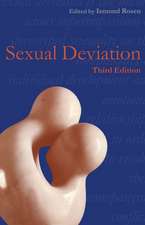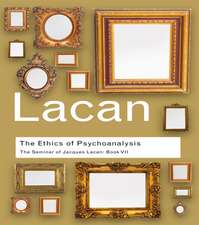Difference and Disavowal: The Trauma of Eros
Autor Alan Bassen Limba Engleză Paperback – 31 dec 2001
Difference and Disavowal is a major rethinking of a central tenet of Freudian psychoanalysis—the repression theory. It centers on fundamental issues in practice and theory, beginning with a central conundrum for clinical psychoanalysis: how to understand apparently analyzable patients who resist the essential therapeutic measure of analysis—interpretation.
The author finds the answer in a revision and expansion of Freud's theory of fetishism. Freud introduced the defense mechanism of disavowal in order to understand what he called the registration and repudiation of reality in fetishism. However, his understanding of the reality disavowed in fetishism is self-contradictory. The contradiction in Freud's argument can be resolved by understanding disavowal in terms of registration and repudiation of difference. The patients who resist interpretation register and repudiate the differentiating process implicit in every interpretation. The problem of resistance to interpretation expands the basic conception of the unconscious to include registration and repudiation of differentiating, processive reality.
Freud's conception of an unconscious force that simultaneously differentiates, binds, and raises tension levels—Eros—demands integration with the theory of disavowal. This integration produces a theory of an inevitable trauma, an inevitable registration and repudiation of difference, as an essential element in psychoanalytic theories of mind, psychopathology, and treatment.
At the end of his life Freud himself was beginning to rethink repression as the cornerstone of his work. He was beginning to see disavowal as the foundation of defensive process. Once disavowal is understood in relation to difference and Eros, one has a major tool with which to rethink the development of Freudian psychoanalysis from its earliest days to the present. The author shows how other analysts—such as Ferenczi, Abraham, Klein, Loewald, and Winnicott—have unwittingly but crucially contributed to the problem of resistance to interpretation
The author finds the answer in a revision and expansion of Freud's theory of fetishism. Freud introduced the defense mechanism of disavowal in order to understand what he called the registration and repudiation of reality in fetishism. However, his understanding of the reality disavowed in fetishism is self-contradictory. The contradiction in Freud's argument can be resolved by understanding disavowal in terms of registration and repudiation of difference. The patients who resist interpretation register and repudiate the differentiating process implicit in every interpretation. The problem of resistance to interpretation expands the basic conception of the unconscious to include registration and repudiation of differentiating, processive reality.
Freud's conception of an unconscious force that simultaneously differentiates, binds, and raises tension levels—Eros—demands integration with the theory of disavowal. This integration produces a theory of an inevitable trauma, an inevitable registration and repudiation of difference, as an essential element in psychoanalytic theories of mind, psychopathology, and treatment.
At the end of his life Freud himself was beginning to rethink repression as the cornerstone of his work. He was beginning to see disavowal as the foundation of defensive process. Once disavowal is understood in relation to difference and Eros, one has a major tool with which to rethink the development of Freudian psychoanalysis from its earliest days to the present. The author shows how other analysts—such as Ferenczi, Abraham, Klein, Loewald, and Winnicott—have unwittingly but crucially contributed to the problem of resistance to interpretation
| Toate formatele și edițiile | Preț | Express |
|---|---|---|
| Paperback (1) | 226.40 lei 3-5 săpt. | |
| Stanford University Press – 31 dec 2001 | 226.40 lei 3-5 săpt. | |
| Hardback (1) | 777.47 lei 6-8 săpt. | |
| Stanford University Press – 31 dec 2001 | 777.47 lei 6-8 săpt. |
Preț: 226.40 lei
Nou
Puncte Express: 340
Preț estimativ în valută:
43.33€ • 44.66$ • 36.58£
43.33€ • 44.66$ • 36.58£
Carte disponibilă
Livrare economică 10-24 februarie
Preluare comenzi: 021 569.72.76
Specificații
ISBN-13: 9780804738286
ISBN-10: 0804738289
Pagini: 328
Dimensiuni: 152 x 229 x 20 mm
Greutate: 0.41 kg
Ediția:1
Editura: Stanford University Press
Colecția Stanford University Press
ISBN-10: 0804738289
Pagini: 328
Dimensiuni: 152 x 229 x 20 mm
Greutate: 0.41 kg
Ediția:1
Editura: Stanford University Press
Colecția Stanford University Press
Recenzii
"For a piece of coherent and seductive theorizing, one must turn to Bass."—Times Literary Supplement
Notă biografică
Alan Bass, a Training and Supervising Analyst at several psychoanalytic institutes in New York, is also on the Graduate Faculty at New School University. He is the translator of four books by Jacques Derrida.
Textul de pe ultima copertă
“For a piece of coherent and seductive theorizing, one must turn to Bass.”—Times Literary Supplement
Descriere
This book is a major rethinking of a central tenet of Freudian psychoanalysis—the repression theory. It centers on fundamental issues in practice and theory, beginning with a major conundrum for clinical psychoanalysis: how to understand apparently analyzable patients who resist the essential therapeutic measure of analysis—interpretation.

















